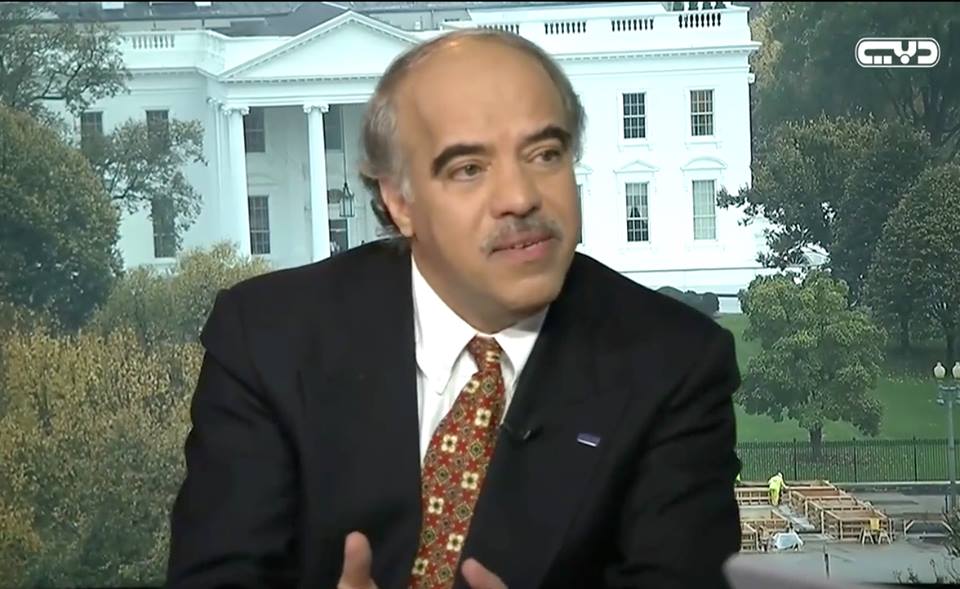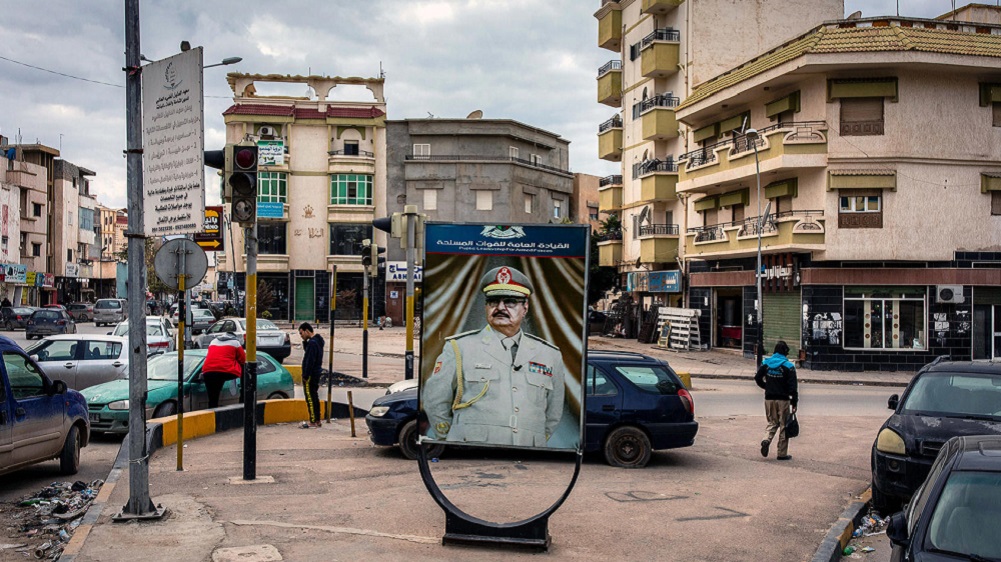
Several puzzling questions have emerged in the volatile Arab geopolitics after two major developments coincided in less than forty-eight hours in the last week of April: First, Yemen’s main southern separatist group, the Southern Transitional Council (STC), decided to establish self-rule in areas under its control, to impose emergency statute in Aden and all southern governorates, and to take control of Aden’s port and airport and other state institutions such as the central bank. The Saudi-backed government warned these measures would have “catastrophic consequences.”(1) An armed unit of the STC fought to wrest control of Socotra's provincial capital, Hadibo, from forces loyal to President Abd-Rabbu Mansour Hadi, backed by Saudi Arabia.
Second, retired general Khalifa Haftar stated his Libyan National Army (LNA) had a "popular mandate" to rule Libya and vowed to press his assault to seize Tripoli. In a televised address on his Libya al-Hadath TV channel, he announced “the general command is answering the will of the people, despite the heavy burden and the many obligations and the size of the responsibility, and we will be subject to the people's wish.”(2) Haftar also declared "the end of the Skhirat Agreement," a 2015 United Nations-mediated deal that consolidated Libya's government. Haftar vowed his forces would work "to put in place the necessary conditions to build the permanent institutions of a civil state." However, he did not specify whether the House of Representatives in Tobruk, eastern Libya would support his plans.
These moves represent two strategic shifts in Yemeni and Libyan geopolitics amidst global health concerns of the Corona pandemic and despite the religious norms of truce during the fasting month of Ramadan. Both moves by the STC in Yemen and General Haftar in Libya imply a strong role of international linkages with certain regional powers, rather than the internal differences between local stakeholders. The fragile balance of power seems to be moving along the strategy of some regional players, notably the United Arab Emirates (UAE), which have pursued an opportunistic type of political realism. UAE has relied on the logic of military power by supporting their armed proxies, and ignored the international agreements and diplomatic efforts of the United Nations to reach solutions accepted by all parties in the Yemeni and Libyan crises.
UAE appears to be accelerating the pace toward exercising full control of southern Yemen and its ports, especially Aden and Socotra, to help enhance its maritime trade and expand its influence in the Red Sea region. It also hopes to expand its political investment in the oil-rich Libya and its strategic position on the southern shore of the Mediterranean Sea. It competes with another regional power, Turkey, which has supported the Government of National Accord (GNA) led by Fayez Sarraj in Tripoli, and provided technological and tactical backing for GNA-aligned militias. In early May 2020, armed clashes in western Libya have stopped Haftar’s forces from advancing and reversed their course of action in some strategic areas.
From a comparative perspective of the Yemeni and Libyan developments in terms of context, dynamics, and trajectory, Haftar’s unilateral Egypt’s 2013 Sissi-like-style declaration of “popular mandate” and intention of imposing some de facto authority in Libya entail serious ramifications and indicate what could be a third legitimacy crisis in the last six years. Haftar’s plans usher to more escalation of an open-ended crisis, which the United Nations Secretary General considers to be a “proxy war”. Another diplomatic puzzle is the future of the Libyan Political Agreement, also known as the Skhirat Agreement," signed on 17 December 2015 at a conference in Skhirat, Morocco.
After a 31-month tenure as UN special envoy to Libya, Ghassan Salamé submitted his resignation to the UN Secretary General António Guterres for ‘health reasons’ March 2, 2020. His decision implied deep frustration in his pursuit, for more two and a half years, “to unite Libyans, prevent foreign intervention, and preserve the unity of the country".(3) The Trump administration has refused to vote for the appointment of former Algerian foreign minister Ramtane Lamamra to replace Mr. Salamé. The U.S. mission to the UN gave no further explanation for opposing Lamamra, who served as Algeria's foreign minister (2013-2017) and as African Union commissioner for peace and security (2008-2013). He has also served as Algeria’s ambassador to the United Nations and the United States in mid-1990s. He is considered an experienced diplomat and has been a mediator in several African conflicts, notably in Liberia.
This two-part paper examines what seems to be the dynamo factor, or driving force, of the Libyan conflict: fluctuation and reconstruction of political legitimacy. Since the summer of 2014, two battles over legitimacy, or two legitimation crises, have spoiled Libyan politics and weakened the UN mediation with two rounds of international recognition of one new political institution or another. Both institutions have required separate budgets of the oil revenues for the rival entities and their respective governments, and claimed distant interpretations of ‘legitimacy’ in the eyes of Libyans and the rest of the world. Moreover, most of the political process and interaction with either the United Nations or foreign governments has been constrained by an ego-inflated dilemma of personal animosity between four particular figures with opposite views, scopes of power, and foreign affiliations.
The paper also probes into the struggle of the UN diplomacy, as it had passed its eighth-year mark September 16, 2019. It examines four main factors. First, the construction of a double-edged legitimacy of two competing institutions: House of Representatives in Tobruq with its government housed in Bayda versus GNA in Tripoli. Second, the foreign interference of certain countries, like Egypt, UAE, Turkey, Qatar, France, and Russia, and the United States has pursued tilting the already flimsy balance of power on the ground in favor one player against another. Third, The Libyan conflict has been subject to several diplomatic initiatives by the African Union (AU), the Arab League (AL), the Gulf Cooperation Council (GCC), the Organization of the Islamic Cooperation (OIC), and the European Union (EU). For instance, the AU initiative opted for a non-removal policy of the Qaddafi regime; but, committed to a “reform process and a political transition.”(4) Fourth, the mismatch between the discourse of ‘national unity’ and the discourse of ‘counterterrorism’ since General Haftar has pledged to “cleanse” the Western part of the country from the perceived “terrorists”. The paper draws on my study of the Libyan case among other Arab conflicts, my previous writings, and fieldwork while serving on the UN Panel of Experts.
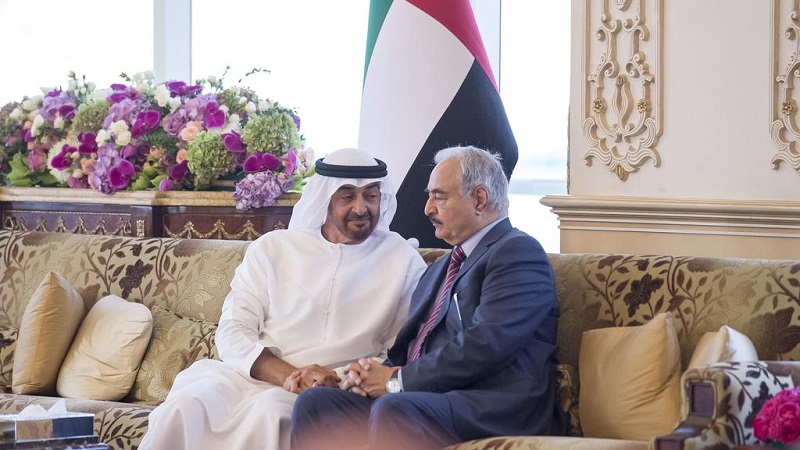
Bargaining with Bullets
Libya has endured bloody confrontations, foreign manipulation, uncompromising diplomacy, and an open-ended stalemate. These challenges seem to have exhausted the UN nine-year diplomatic maneuvering of the Libyan conflict. The overall scene presents Libya as synonymous to violence, lawlessness and statelessness, while lurking at the border between a ‘fragile state’ and a ‘failed state’. Libya represents a typical scenario of the gap between the normativity of the UN mediation and the realist strategic bet of foreign stakeholders on their armed proxies in the field. The nine-year long UN mediation has been outperformed by cycles of diplomatic overtures in Tunis, Skhirat, Geneva, Paris, Palermo, Abu Dhabi, Moscow, and Berlin, followed by new rounds of fierce infighting on the ground between the Tripoli-versus-Tobruk camps. In his book “International Mediation in Civil Wars”, Timothy Desk points to the transnational flow of weapons, resources, and ideas, which “means that when civil wars today end, they are more likely to do so at the negotiating table than on the battlefield.”(5)
In the early 1990s, Edward Azar, one of the forefathers of Conflict Resolution, developed his nuanced theoretical framework of Protracted Social Conflict (PSC) as a culmination of four main clusters, which lead to violent conflict: 'communal content’, 'human needs’, 'governance and state’s role’, and 'international linkages’. He expects these conflicts to occur “when communities are deprived of satisfaction of their basic needs on the basis of the communal identity. However, the deprivation is the result of a complex causal chain involving the role of the state and the pattern of international linkages.”(6) Consequently, the interests of foreign players tend to suppress the will to reconciliation among internal contenders. In most instances, those international linkages dictate the internal policy along two types of subordination: economic dependency and client relationships.
Prior to the UN General Assembly held in New York in September 2019, Haftar’s forces faced tough resistance in their attempt to capture the capital, Tripoli, from the Government of National Accord. The World Health Organization (WHO) reported the fighting between pro-GNA and pro-Haftar forces killed at least 1,093 people, wounded 5,752, and forced some 120,000 into displacement.(7) Former UN envoy Ghassan Salamé told the UN Human Rights Council the conflict had spread outside Tripoli with air and drone attacks against the port city of Misrata, Sirte, and Jufra in central Libya. He expressed concern as “the conflict risks escalating to full-blown civil war… It is fanned by widespread violations of the UN arms embargo by all parties and external actors."(8)
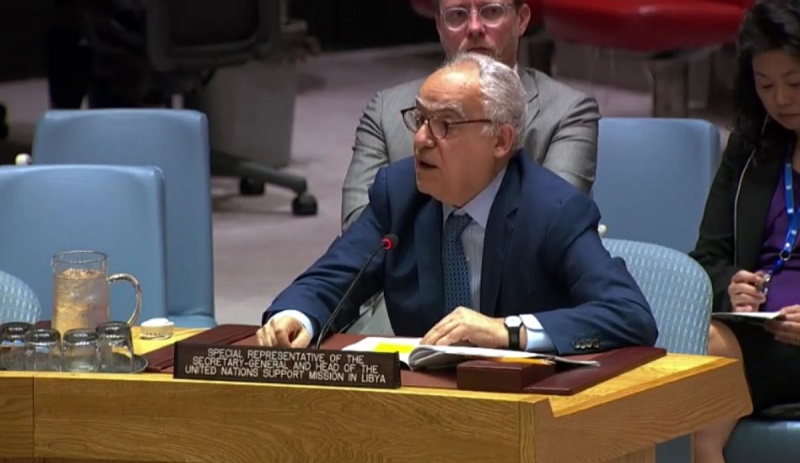
Consequently, the philosophy of the UN Resolution 1973 (March 2011) which established the United Nations Support Mission in Libya (UNSMIL), has gone astray. UNSMIL emerged with the aim of “find(ing) a peaceful and sustainable solution” to the crisis; and, most recently, Resolution 2376 (2017), have extended the mission mandate for mediation and provision of good offices, including (since December 2015) supporting the implementation of the Libyan Political Agreement. There have been recurring themes of “promising” dialogue and “imminent” reconciliation, proposed by six consecutive UN special envoys: Abdelilah Khatib (2011), Ian Martin (2011-2012), Tarek Mitri (2012-2014), Bernardino León (2014-2015), Martin Kobler (2015-2017), and Ghassan Salamé (June 2017- March 2020).
The struggle of the United Nations diplomacy in Libya represents one of several challenges of international mediation in contemporary Arab conflicts. The protracted Libya conflict remains a snapshot of several deadlocks, which have undermined the United Nations mediation and desired political transition, in the North African oil-rich country after the fall of Qaddafi regime. In his concluding chapter in the 2018 Davos edition “The Future of Politics”, politician-turned-Harvard scholar Nicholas Burns wrote: “nearly all of the Middle East’s twenty-two Arab countries are worse off, not better off… Stability and hope in the region are in very short supply. Four important Arab countries – Libya, Yemen, Iraq and Syria – are essentially ‘failed states.’ Libya’s warring tribes continue to contest for power with the outcome in doubt.”(9)
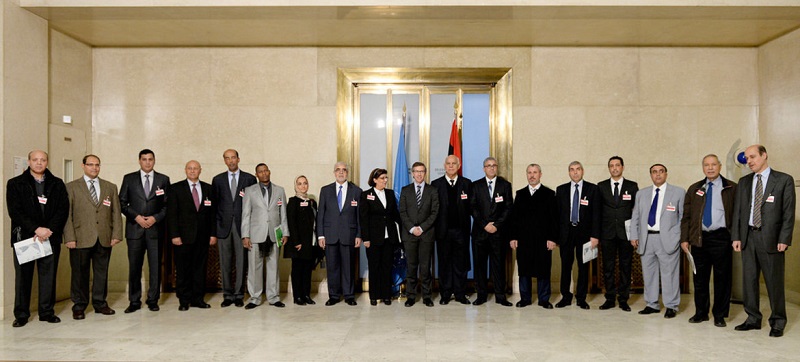
UNSMIL as a Wishful Platform of UN Mediation
The most recent SC Resolution 2486 (2019), was adopted September 12, 2019, to keep UNSMIL operational until September 15, 2020; and recognized that “since 30 March 2016 UNSMIL has gradually established a consistent presence in Libya, and welcomes UNSMIL’s progress in re-establishing a presence in Tripoli, Benghazi and other parts of Libya, as security conditions allow. This presence inside Libya was impossible for nearly eight years of UNSMIL’s existence. The United Nations peacemaking efforts between the two rival parliaments and governments gained some short-lived momentum after brokering, as mentioned earlier, a power-sharing agreement, the Libyan Political Agreement, in December 2015. Yet, the deal soon ran into difficulties and ushered in a new phase in the conflict.(10)
The frequency of infighting between the western and eastern camps, not to ignore several rogue militias, has derailed both political and humanitarian progress if one considers the dilemma of slavery, detention, and abuse of sub-Saharan migrants. So far, the UN diplomacy remains sandwiched between the interpretative legitimacy as a political construct, bestowed on the former by the international community under the Skhirat process, and the claimed military ‘determinism’ of the latter.
In his briefing to the Security Council September 4, 2019, then-UN envoy Ghassan Salamé stated, “many Libyans feel abandoned by part of the international community and exploited by others.” He also warned of two “highly unpalatable scenarios” if the Council and broader international community fail to support an immediate end to the conflict — either a persistent and low-intensity conflict with continued fratricide among Libyans, or a doubling down of military support to one side or the other by their external patrons, resulting in a sharp escalation and regional chaos.(11)
UN chief António Guterres has publicly condemned “the descent of Libya into political uncertainty and armed hostilities during the reporting period as deeply alarming.” He also remains concerned about the impact on civilians of the shelling of residential areas and about the reports of targeted attacks and the destruction of vital infrastructure.(12) By the end of 2019, Salamé was cynical of the external support, which was “instrumental in the intensification of airstrikes,” and “imported weaponry is being accompanied by foreign personnel working as pilots, trainers and technicians.”(13) In Europe, four well-publicized meetings were held; one in Paris and another in Palermo, for reaching a Libyan reconciliation in 2018, and a third in Moscow and a fourth in Berlin in early 2020. However, they failed to bring about any diplomatic breakthrough.
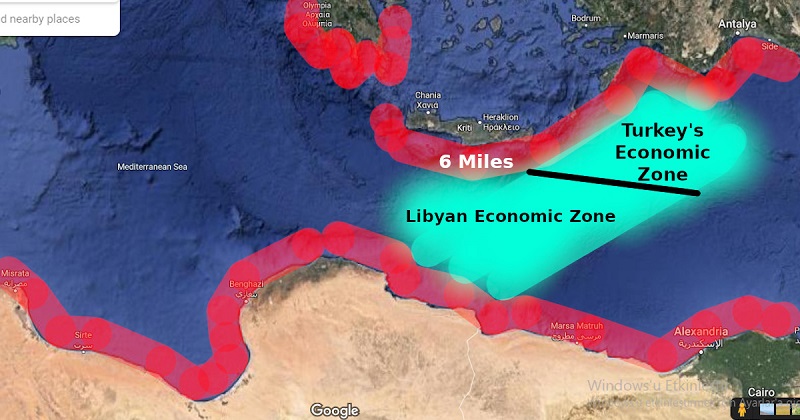
Detractors of the UN Mediation in Libya
With the open-ended cycle of violence, death toll, and civilian suffering in Libya, new questions arise now about the claim of pragmatism of intervention. Whether the United Nations can, at this point, avoid more civilian fatalities, provide humanitarian assistance for millions of internally-displaced persons and refugees, or guide any mechanism of peaceful transition into stability in Libya, and other those failed states like Yemen, Syria, and Iraq. What would be the minimum expectation from the world organization now?
There might be some alternative approaches to what I term a good-enough paradigm of conflict management, whereas affected civilians and concerned public opinion hope for effective frameworks of conflict resolution and peacebuilding. Back in January 2018, Salamé explained how the complexity of the Libyan crisis pivoted around a conflict over resources in his remarks to the Security Council. He then reiterated his UNSMIL team’s commitment to three fundamental objectives: a) adopting a new constitution as a permanent legal framework, 2) reformulating a Libyan national polity, and 3) holding general elections while more than two million Libyans have put their names on the electoral register. As I wrote previously, “the majority of Libyans feel less enthusiastic and believe the current deadlock is too strong to make any real political overtures. The only political momentum in Libya at present is the United Nations’ search for a new impetus among rival centers of power, including the militias. However, leaders of political and military rival groups are reluctant to engage in the UN process or to commit to any final decision.(14)
The UN diplomacy seems to be undergoing a period of fatigue. It has apparently exhausted its energy in searching for efficient formulas of conflict transformation, not to insist on full-fledged conflict resolution. The UN literature asserts, “When an effective mediation process is hampered, other efforts may be required to contain the conflict or to mitigate the human suffering, but there should be constant efforts to remain engaged so as to identify and seize possible windows of opportunity for mediation in the future.” So far, six UN envoys have experimented with a variety of mediation techniques and combined their institutional guidelines with their personal touch in managing the Libyan conflict. Any revision of these approaches should take into consideration four main challenges.
1. Fragmented Legitimacy
As mentioned in the introduction, two battles over legitimacy, or two legitimation crises, have spoiled Libyan politics and UN mediation with two rounds of international recognition of one new political institution or another. Habermas conceptualizes legitimation crisis as “an identity crisis that results from a loss of confidence in administrative institutions, which occurs despite the fact that they still retain legal authority by which to govern.”(15)
a. First Battle – Why HoR?
I joined the UN Panel of Experts on Libya less than three months after holding the general elections of June 25, 2014, which gave birth to the House of Representatives in Tobruq, and later the first government in Bayda led by Prime Minister Abdullah al-Thani. The turnout was very low at 18 percent, while most candidates ran as independents. Nationalist and liberal factions gained momentum by securing the majority of seats, whereas the Islamist groups’ representation shrunk to around 30 seats. There was common interpretation of this electoral outcome that the Islamist forces faced “a devastating loss at the ballot box, and now face a genuine existential threat.”(16) The ballot results triggered several reactions nationally and internationally. The majority of Libyans, the new parliament, and the international community, would expect the Islamists “to accept the will of the Libya people expressed through the ballot box, and to refrain from using unorthodox tactics, such as using armed militias to influence the political process.”(17)
The United Nations swiftly recognized the HoR as “the only legitimately elected legislature.”(18) Then-UN envoy Tarek Mitri attended its inaugural session in Tobruq August 4, 2014; and later expressed some regret in his report to the Security Council. He wrote, “Many efforts, including ours, to arrive at an agreement over procedural and related issues failed to ensure full participation of all elected members. A number of representatives decided to boycott the sessions. Underlining the importance of safeguarding Libya’s fragile transition, with the House of Representatives as the only legitimately elected legislature, we affirmed that every effort must be exerted towards enabling parliamentarians, who boycott the House of Representatives, to join their colleagues.”(19)
However, the political elite of the west and their Misrata fighters’ supporters, with links to Operation Dawn, did not accept the emergence of HoR as Libya’s new legislative assembly in lieu of the Tripoli-based General National Congress (GNC). A new war of narratives erupted between the two political camps, and the conflict over the constitutionality of HoR became a wider legal battle before the Supreme Court. Throughout the summer of 2014, the gap deepened between the two de facto parliaments and rival governments over political legitimacy and control of the country’s vast energy reserves. In ancient Greece, Aristotle argued the legitimacy of the government relied upon constitutionalism and consent; but also posited that political stability relied upon the legitimacy of rewards.(20)
In early November 2014, the Supreme Court invalidated the election of the HoR, and stated that the Election Law Committee “had violated Libya’s provisional constitution.”(21) The Court verdict led to celebrations in the streets of Tripoli, as it meant the no-constitutionality of HoR in Tobruq. Nouri Abusahmain, then-head of GNC told reporters “we the General National Congress call for dialogue. A dialogue serves national reconciliation, stability and development.”(22) However, HoR rejected the Court’s decision arguing it was made "at gunpoint"(23), with the court being controlled by armed militias. The UNSMIL team was taken by surprise, and the zest of its reaction was “an urgent need for all parties to forge consensus on political arrangements”.(24) Consequently, the Tripoli-Tobruq political rivalry and emergence of Haftar, as the ‘strong man’ of the east, have had negative impact on the UN mediation efforts.
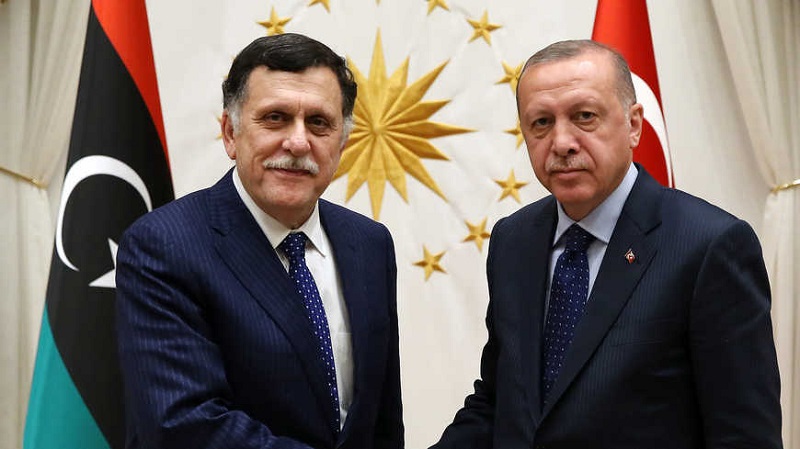
b. Second Battle - Why GNA?
A second reconstructed legitimacy emerged between November 2014 and October 2015. The UN mediation focused on multi-track, cross-elite, cross-tribe negotiations held in Tunisia, Algeria and Morocco. Bernardino León, then-head of UNSMIL, engaged in some shuttle diplomacy between HoR and GNC around a compromise prime minister Faiez Serraj. By mid-October, he secured the initial acceptance of both sides of a revised version of a framework of power sharing. The diplomatic breakthrough was celebrated October 17 in Morocco by signing the new Libyan Political Agreement.
The new agreement established a nine-member Presidency Council and a seventeen-member interim Government of National Accord, with the ambition of holding new elections within two years [October 2015-October 2017]. It also maintained the continuity of HoR as a legislature and advisory body, to be known as the ‘High Council of State’. This shift represented the best possible scenario of national unity and positive engagement of several stakeholders. As the Agreement introduction reads, “Members from all these three legislative bodies made very important contributions to the dialogue process and to the conclusion of this agreement. Other independent stakeholders participated as well. The armed groups, municipal councils, political parties, tribal leaders, and women's organizations contributed to other elements of the dialogue to promote a genuine and stable reconciliation.” The Security Council announced its support of the Government of National Accord as “the sole legitimate government of Libya”, and stressed, “a Government of National Accord that should be based in the capital Tripoli is urgently needed to provide Libya with the means to maintain governance, promote stability and economic development.”
In the following two years, the military open-ended Karama (Dignity) operation, led by General Haftar, has scaled back the diplomatic hopes of the United Nations. The battle over legitimacy is not only political Tobruq and Tripoli; but, also entails the complexity of the military-civilian relations in the country. Haftar is one good example of how certain military figures tend to flex their muscles in the field, intimidate the political will of Prime Minister Serraj, and impose their fait accompli at every turn of the negotiating process. By mid-December 2017, He declared the Skhirat agreement “void”. So far, Haftar’s intention is “to seize, rather than share, power can come as no surprise.”(25)
Several factors have solidified these disputing constructs of legitimacy: electoral legitimacy, international legitimacy, military legitimacy, and others. The International Crisis Group has noticed, “While international rifts and competing regional ambitions remain an overarching conflict driver, locally, interlocking competing narratives of political and military legitimacy, a battle for power, tribal rifts and recriminations, and a deeply polarized media are making the war even more intractable.”(26)
Part 2 of the paper will address the impact of international linkages in Libya, the question of parallel or rival diplomacies, and what is behind the counterterrorism discourse, and some concluding remarks.
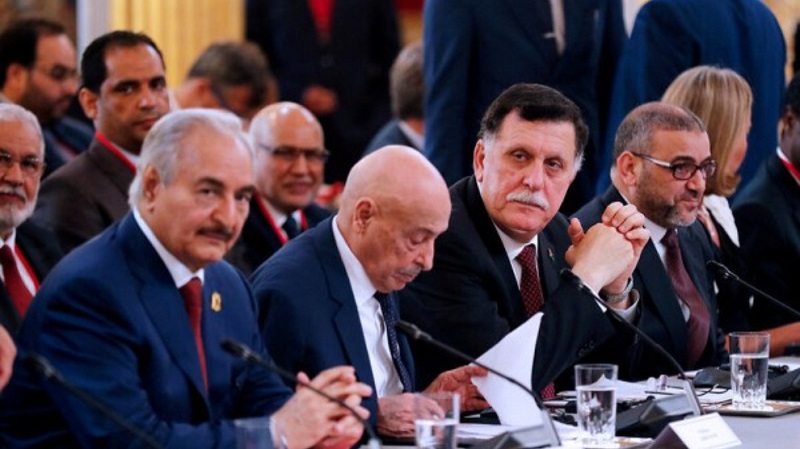
(1) Mohammed Ghobari, Mohammed Mokhashef, “Yemen separatists announce self-rule in south, complicating peace efforts”, Reuters, April 26, 2020 https://www.reuters.com/article/us-yemen-security-south/yemen-separatis…
(2) DW News, “Libya: Khalifa Haftar declares 'popular mandate,' end to 2015 UN agreement”. DW, April 27, 2020 https://www.dw.com/en/libya-khalifa-haftar-declares-popular-mandate-end…
(3) BBC, “Libya conflict: 'Stressed' Ghassan Salamé resigns as UN envoy,” BBC News, March 2, 2020 https://www.bbc.com/news/world-africa-51713683
(4) Peter Bartu, “Libya’s Political Transition: The Challenges of Mediation”, International Peace Institute, December 2014
(5) Timothy D Sisk, International Mediation in Civil Wars: Bargaining with Bullets, Routledge; first edition, 2008
(6) Edward E Azar, The Management of Protracted Social Conflict: Theory and Cases, Dartmouth Pub Co. 1990
(7) Aljazeera News, “Libya's Khalifa Haftar says open to dialogue as fighting drags on,” September 29, 2019 https://www.aljazeera.com/news/2019/09/libya-khalifa-haftar-open-dialog…
(9) Nicholas Burns. “An Outlook on Global Politics”, in The Future of Politics, Credit Suisse, 2018 Davos edition
(10) Lisa Watanabe, “UN Mediation in Libya: Peace Still a Distant Prospect,” CSS Analyses in Security Policy, No. 246, June 2019
(11) UN News, “International Meeting Essential to Getting Libya-led Political Process Back on Track, Ending Conflict, Special Representative Tells Security Council”, Security Council 8611TH, September 4, 2019
(12) António Guterres, United Nations Support Mission in Libya Report of the Secretary-General”, S2019/682, 26 August 2019
(13) Ghassan Salamé, “With Libyans now ‘fighting the wars of others’ inside their own country, UN envoy urges Security Council action to end violence”, UN News, July 29, 2019 https://news.un.org/en/story/2019/07/1043381
(14) Mohammed Cherkaoui, “Fits and Starts Characterize UN Mediation in Yemen, Syria, and Libya”. Arab Center DC, February 7, 2018, http://arabcenterdc.org/policy_analyses/fits-and-starts-characterize-un…
(15) Habermas, Jürgen (1975). Legitimation Crisis. Boston: Beacon Press.
(16) Mohamed Eljarh, “Libya’s Islamists Go for Broke”, Foreign Policy, July 22, 2014 https://foreignpolicy.com/2014/07/22/libyas-islamists-go-for-broke/
(18) Tarek Mitri, “Security Council Briefing”, 27 August 2014 https://unsmil.unmissions.org/sites/default/files/SRSG%20SC%20briefing%…
(19) Tarek Mitri, “Security Council Briefing”, 27 August 2014 https://unsmil.unmissions.org/sites/default/files/SRSG%20SC%20briefing%…
(20) Morris, Zelditch Jr. (September 2001). Jost, John; Major, Brenda (eds.). The Psychology of Legitimacy Emerging: Perspectives on Ideology, Justice, and Intergroup Relations. Cambridge University Press. pp. 33–53, 38.
(21) Reuters, “Libya faces chaos as top court rejects elected assembly”, November 6, 2014 https://www.reuters.com/article/us-libya-security-parliament/libya-face…
(23) Aljazeera News, “Libyan court rules elected parliament illegal, November 7, 2014 https://www.aljazeera.com/news/middleeast/2014/11/libyan-court-suspends…
(24) Reuters, “Libya faces chaos as top court rejects elected assembly”, November 6, 2014 https://www.reuters.com/article/us-libya-security-parliament/libya-face…
(25) Paul Taylor, “France’s Double Game in Libya”, POLITICO, April 17, 2019 https://www.politico.eu/article/frances-double-game-in-libya-nato-un-kh…
(26) ICG, “Avoiding a Protracted Conflict in Libya”, July 22, 2019 https://www.crisisgroup.org/middle-east-north-africa/north-africa/libya…;
